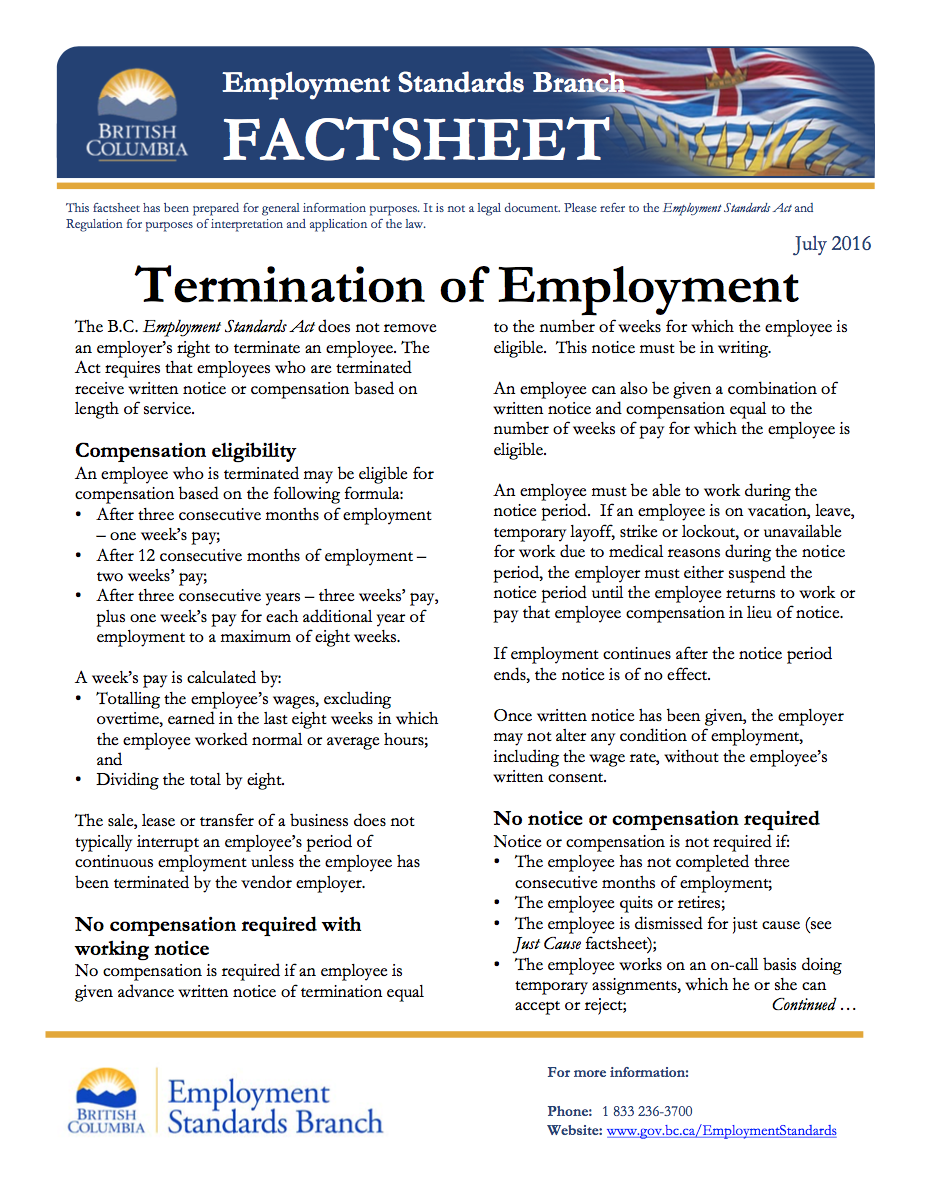- Essential Bookkeeping Habits For Audit Ready Books in Canada
- Payroll Manual
- Terminating an Employee
Why You Need An Employment Contract
Labour Laws and Terminating an Employee in Canada
Applies To Contract Of Service Relationships | Employer - Employee Status
By L.Kenway BComm CPB Retired
This is the year you get all your ducks in a row! Start by starting.
Revised July 24, 2024 | Updated June 18, 2024 | Edited June 5, 2024 | Originally published on Bookkeeping-Essentials.com in January 2019
WHAT'S IN THIS ARTICLE
Contract notice vs common notice vs statutory notice | Oral vs written employment contracts | Contents of a written employment contract | Consideration for signing a revised employment contract | Release of claims in exchange for severance | *NEW Recent court rulings on termination clauses
MORE >> Employment and Labour Standards in Canada
Do you have written employment contracts for all your employees? If your answer is no ... this chat will discuss why it is important that small business owners have a written employment contract with all of its employees.
This article was written based on my working experience in British Columbia. However, please note that the courts in Canada are increasingly making it difficult to enforce termination clauses.
Click here to continue reading.
 Learn why you need a written employment contract
Learn why you need a written employment contractWhat Is The Problem With
Verbal Employment Contracts
Most small business owners do not have a written employment contract for each of their employees. They interview them and hire them. They get them to complete the Federal and Provincial TD1 forms so they can setup payroll and perhaps a void cheque if they pay by direct deposit.
The problem around a verbal employment contract is what happens when the relationship sours and you have to terminate an employee, or cash flow is tight and you have to let an employee go.

The Lesperance Mendes Guidelines for Employment Terminations in British Columbia, authored by Naomi Rozenberg, explains that employers have a right to dismiss employees with or without cause at any time. I can hear small business owners saying, "Darn right I can." Well hold on a minute because if you are letting an employee go without cause, you need to know about things like working notice and severance requirements in addition to the labour standards in your province.
There are three areas you need to be aware of as an employer to minimize your liability in this area:
- Statutory law notice provisions
- Common law notice provisions
- Contract law notice provisions
Your liability can be paid through minimum notice as defined under your provincial employment standards act PLUS reasonable notice or payment in lieu of notice ... I.E. a severance payment.
I am not qualified to talk about the complexities around employment law but as a bookkeeper, I have seen the issues that arise when an employee is terminated improperly and everything goes sideways. Small business owners need to be aware of their liability in this area. Use this chat as speaking points to discuss your exposure with your lawyer or HR expert consultant.
Good To Know
Oral vs. Written Contract Agreements
While terms of employment can be made by express or implied oral agreement or the conduct of the parties involved, an oral agreement exposes your liability when an employee is terminated.
One of the reasons why it is critical that you need a written employment contract is to minimize liability upon the termination of an employee. This is because reasonable notice under common law is dependent on individual circumstances. Severance requirements can far exceed provincial labour standards.
Provincial Labour Laws and Standards
Statutory requirements around minimum notice are covered under provincial labour laws. Most small business employers are aware that provincial employment standards set the rules around the minimum notice and the business owner's liability to compensate the employee.
Minimum notice can be through compensation or working notice in lieu of compensation.

If you google "termination of employment BC" for example, you will find the Employment Standards Branch fact sheet on the subject. It concisely summarizes the statutory requirements about:
- compensation eligibility
- how a week's pay is calculated
- when no compensation is and is not required
- temporary layoffs and group terminations
- deemed employment terminations
- wrongful dismissal
- payment of final wages
- if an employee quits
- collective agreements
Each province has its own statutory requirements. Some key highlights you'll find when you read through the BC factsheet are:
- employees who are terminated must receive written notice or compensation based on length of service
- after 3 consecutive months of employment, the employee is eligible for one week's pay; after 12 months, 2 month's pay; and after 3 years, 3 month's pay plus one week's pay for each additional year of service to a maximum of 8 weeks.
- no compensation is required if an employee is given equal advance written notice however once the notice is given, conditions of employment may not be altered, including the wage rate, without the employee's written consent.
- there is a long list of events that result in no notice or compensation requirements
- final wages must be paid within 48 hours after the last day a terminated employee works; 6 days if they quit voluntarily.
Common Law Notice
You Do Not Have A Written Employment Contract
Common law notice comes into play when you do not have a written employment contract. This is where most small business owners fall if they just hire employees with verbal consent.
The concept of reasonable notice is very vague and uncertain under common law notice. Google "written employment contracts" to find the factors reasonable notice is based on in your province. The Ontario High Court decision of Bardal v. The Globe & Mail Ltd. identified factors that must be taken into account under common law notice. Some of the factors are length of service, age of the employee, type of position held and availability of similar employment.
Contractual Law Notice
You Do Have A Written Employment Contract
A contractual notice comes into play when an employer has a written employment contract. In B.C., if the written employment contract does not comply with the province's Employment Standards Act minimum notice period, the employee can only be dismissed without cause if given reasonable notice of termination.
Reasonable notice is not necessarily the same as statutory minimum notice. The BC Court of Appeal has ruled that it is not practical or reasonable to make it the employee's responsibility to keep an eye on the relationship between the statutory minimum and the contractual term. This is the employer's responsibility.
A lawyer will help you determine if your proposed reasonable notice would be enforceable. A province's labour laws for minimum notice are usually suitable for junior level employees but may not be sufficient for more senior levels or long term employees.
What to Include in a Written Employment Contract
All small business employers should have written employment contracts with all their employees. This means when offering an employee a job ... put it in writing in the form of a letter on your letterhead.
A basic written employment contract should confirm the terms such as position, start (and end if applicable) date, salary, benefits, vacation pay (or time) ... AND what notice provisions apply in the event either party terminates the agreement.
Here is a sample offer of employment letter to run by your lawyer to see if it meets your province's labour laws and whether the work notices would be enforceable in court. There are so many nuances in law, please do not skip this step.
Date
Name and address of person being offered the employment
Re: Offer of Employment - [Job Title]
Dear [First Name],
Following our recent discussion, we are pleased to offer you the position of [Job title] with [your business name]. This job is contingent upon the following:
- [enter your conditions] such as ...
- Providing three references;
- Your references check out;
- Passing an RCMP Criminal Record Check prior to beginning employment
Insert a short paragraph that gives an overview about your business.
Insert a paragraph about your expectations regarding ethics and commitment. For example, We ask for your commitment to [insert what you want them to commit to while carrying out their job]. We expect [Insert your expectations ... for example ... personal accountability with regards hours worked and interactions with customers. It is expected that all government laws and regulations will be adhered to in the performance of your duties.] In return, we are committed to [insert what you commit to].
The following points outline the terms and conditions we are proposing.
Job Title:
Job Description:
Start (and End) Date:
Wage:
Benefits: [include vacation terms here]
Probation: There is a ninety-day probation period in accordance with [your province] labour laws.
Hours of work:
Supplies and materials:
Other stuff unique to job such as weather if the work is outdoors, or unpaid time off.
Reporting relationship:
Payment of wages: explain how they get paid such as how they submit their hours, whether they are paid by cheque or direct deposit (need a void cheque), forms they need to fill out such as TD1s.
Criminal Record Check: This job is contingent on you applying for and submitting an RCMP criminal record check to [person's name and title] before you begin employment. Note this usually takes 7-14 days.
Following the initial probation, we will clarify or modify our arrangement as the need may arise.
This arrangement may be terminated by either party upon notice in writing to either party with notice that complies with [your province] Employment / Labour Standards.
We look forward to the opportunity to work with you and welcome you to [your business name].
Sincerely,
Your name and position
With the signature below, I accept this offer of employment
______________________________ ______________
Name of Prospective Employee Date
Consideration for Signing a Revised Employment Contract
In BC, an employer must give an EXISTING employee consideration for signing a new or revised employment contract. Consideration could be a bonus, raise or new benefit. I get this if you are offering them a promotion or adding responsibilities, but what happens if you are downsizing the job requirements or reorganizing job responsibilities for better work flow due to business growth for example? This is something to discuss with a lawyer.
The BC factsheet on terminations explains it may deem the employment terminated if you substantially alter a condition of employment. If that happens, the Employment Standards Act for termination applies.
What you definitely cannot do is make the employee's continued employment a bargaining chip to be traded for a signature on the new or revised employment contract. It may be better to let the employee go if the position is no longer available because you are revising it substantially then have them apply for the new position.
However the BC termination factsheet also says no notice or compensation is required if the employee refuses reasonable alternative employment. This is why you definitely should speak with a lawyer before you consider action to ensure you minimize your liability risk because there are a lot of nuances in employment law.
Severance Payment
When designing and offering your severance payment, ensure it will be considered adequate. Usually the severance payment is contingent on the employee signing a release.
Keep in mind, the minimum statutory notice required in your province does NOT form part of the severance payment. It must be paid. The severance payment is in addition to the statutory notice requirements. For higher levels of employment, you need to carefully consider the advantages and disadvantages of payments paid over time vs. a lump sum payment.
It is the employer's responsibility to make and remit all statutory deductions from the severance payment. This would include CPP, EI and income tax withholdings required by CRA.
You have no obligation to provide a letter of reference but read Lesperance Mendes' Guide to learn why you may want to.
If you want to offer a severance payment in exchange for a release, you can google "sample termination agreement Canada" or "sample termination template Canada" to find a sample release agreement. HRInsider.ca has a comprehensive sample template based on Ontario laws but you could have your lawyer review and modify it for your provincial laws and situation.
It is my understanding that a release agreement cannot state that the employee may not, for example, report the termination to the Labour Board ... remember nothing can be contrary to their rights as established under law. The release can however state their obligations around confidentiality and bad mouthing your business.
Termination with Cause
I will leave you to research your right as an employer around terminating with cause such as employee misconduct or poor performance.
Be aware that the onus to prove just cause usually lies with the employer. This could include clear performance objectives, additional training, as well as verbal and written warnings. Warnings have to contain four elements to be valid - explanation of why performance is substandard, what employee needs to do to improve performance, state timeline (must be reasonable) to improve, what happens if standards aren't met. Please refer to the Lesperance Mendes Guide for more information on this.
Recent Court Rulings on Termination Clauses
McInnes Cooper law firm in Atlantic Canada has an excellent May 30, 2024 webinar that reviews four recent Ontario cases and one in New Brunswick where the court ruled termination clauses in the employment contract as null and void. The main reasons were due to the clauses being contrary to the minimum employment standards.
When looking at the contracts, the courts lean towards the employee because they have less bargaining power than the employer and less understanding of minimum labour standards.
The five cases reviewed were
- Waksdale 2020 ON - just cause terms challenged
- Rahman 2022 ON - no cause terms challenged
- Henderson 2022 ON - no cause, conflict of interest, and confidentiality clauses challenged
- Dufault 2024 ON - for cause and no cause terms challenged
- Dornan 2023 NB - fixed term contract becoming an enduring contract
- Dufault 2024 ON - enduring contract was changed to a fixed term contract
This webinar explains that using a written employment contract is a good start but it must be structured in such a way that it is enforceable. In very general terms, I understood this to mean ALL aspects of the contract must not be contrary to employment and labour standard laws now or in the future. The province the employee works in are the laws that apply.
Towards the end of the webinar, they give you practical tips to avoid or diffuse any issues with your existing employment contracts.
It is worth your time to listen to this hour long presentation on how to make sure your written employment contracts are enforceable. Watching this webinar helps you understand why it is so important to run any written employment contract past a lawyer.
Wrap Up - Why You Need An Employment Contract
A small business owner must act very carefully when dismissing an employee if they do not have a written employment contract. Having a written employment contract for every employee hired reduces your liability for damages should it become necessary to terminate the employee in the future.
As I mentioned at the beginning of this chat, I am not qualified to talk about the complexities around employment law but felt strongly that small business owners need to be cognizant of their liability in this area. Be proactive and use both these resources along with this chat as speaking points to discuss your circumstances and exposure with your lawyer:
- Download the Lesperance Mendes Guide.
- Watch the McInnes Cooper Employment Contract webinar.









